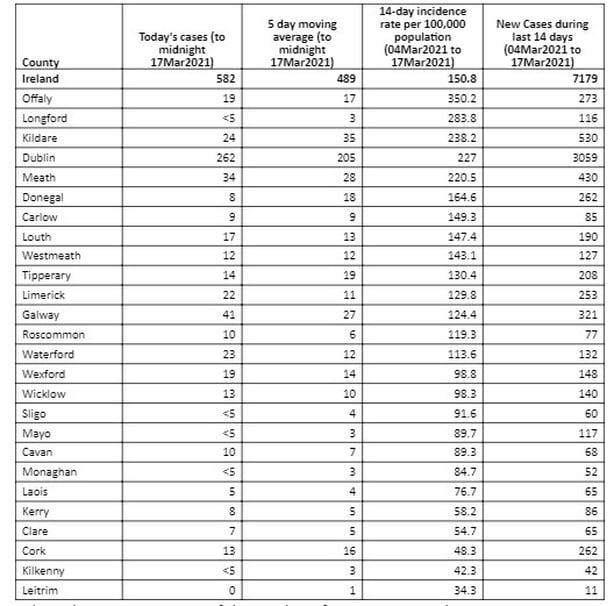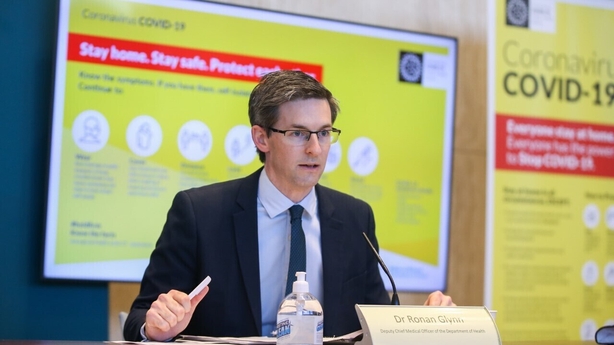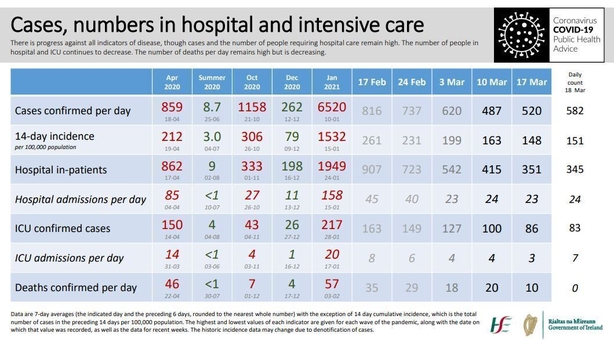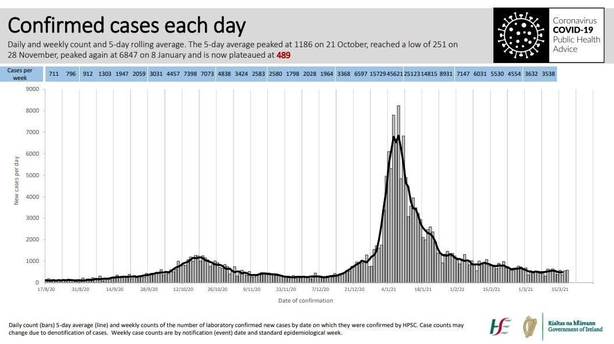The Chair of the Irish Epidemiological Modelling Advisory Group Profesor Philip Nolan has said the number of new cases of Covid-19 are "static or declining slowly".
Prof Nolan's comments come as the Department of Health reported no further Covid-19 related deaths and 582 additional cases.
There are 83 patients in intensive care units, the same number as yesterday.
The department has been notified of 228,796 confirmed cases of Covid-19 since the pandemic began.
Of today's cases, 290 are men and 291 are women, while 74% are under 45 years of age. The median age is 32.
In a regional breakdown of cases, 156 were reported in Dublin, 23 in Meath, 19 in Donegal, 15 in Louth, 14 in Kildare and the remaining 198 cases are spread across 20 other counties.

As of 8am today, 345 patients with Covid-19 are in hospital and there were 24 additional hospitalisations in the past day.
The number of vaccines administered in Ireland up to 15 March is 620,580.
Of these, 455,182 were given to people receiving their first dose and 165,398 were giving to people have received their second dose.
In Northern Ireland, there has been one additional coronavirus related death taking the official toll to 2,101. There have been four Covid-19 related deaths during past 7 days, compared to 27 in the previous week.
There a further 169 cases of the virus diagnosed.
Prof Nolan said there is no specific pattern across age groups under 65, all age groups are making their own contribution to the incidence of disease.
He said: "To my mind, and from evidence, you can quite clearly trace that relatively constant case count to an increase in mobility, congregation and social mixing."
Prof Nolan said the numbers in hospitals and intensive care continue to decline week on week.
What is of concern, he said, is the number of admissions to hospital per day also has been static at between 20 and 25 since the start of March.
Prof Philip Nolan says both 5 and 7-day average case counts have been static for about a week. In terms of hospital admissions, he says the number per day is also static - between 20 and 25 - since the start of March. He says that this is a concern | https://t.co/gaWKT5uDYd pic.twitter.com/mHHQlYAP8l
— RTÉ News (@rtenews) March 18, 2021
Prof Nolan said test positivity and the demand for tests have stabilised and there is a pattern of younger children being referred for testing, which is "understandable".
He said between the week before last and last week there was an uptick in numbers and between last week and this week they have seen relatively constant case numbers.
Prof Nolan said there is a continued decrease in the number of people in intensive care "although one might worry not [it is] decreasing as quickly as it has been over the preceding five or six weeks".
He said day-on-day cases in age groups that are "more mobile" with higher levels of social mixing are fluctuating in a more volatile manner.
Prof Philip Nolan says that the number of Covid-19 cases are either "static or declining slowly". He says that reproductive (R) number of the virus is between .8 and 1.1 | https://t.co/gaWKT5uDYd pic.twitter.com/4vFEHtp902
— RTÉ News (@rtenews) March 18, 2021
Prof Nolan said that explains a little bit about the origin of the fluctuating instance that is being seen in the wider population.
He said there is no single age group that is contributing to the current stasis in case numbers.
Prof Nolan said they are seeing cases and outbreaks in schools, but those outbreaks do not necessarily mean the transmission occurred in schools.
He said one would expect to see more cases and outbreaks as the weeks go by, given the large population in schools and the high instance of the disease.
Prof Nolan said: "Nonetheless, the number of cases being detected in school outbreaks remains a very small fraction of the total number of cases in the population."
Also speaking at the briefing, the Deputy Chief Medical Officer welcomed the decision by the EMA about the AstraZenenca vaccine.
Dr Ronan Glynn said an update will be issued tomorrow after NPHET, the National Immunisation Advisory Committee and the Health Products Regulatory Authority come to a position on the issue.
He said the three bodies will meet tonight and tomorrow morning to discuss the development.
Dr Glynn said vaccines are "no good" if people are not willing to take them, but they have seen "really high levels" of vaccine confidence in this country.
He said the issues from the last week will "no doubt" pose a challenge, but the challenge for them is to make sure that people's questions are answered clearly.
Dr Glynn said he hopes that it will give people confidence that safety comes first and therefore they will have more confidence moving forward.

He said: "Over time we will have to continually address new rumours, new falsehoods.
"But we also have to address safety signals and ensure that we answer questions and make sure people have the information that they need to hand."
Dr Glynn also said they are asking the public to do just a little bit more than what they are doing.
He said: "Go back to where you were a fortnight, three weeks ago.
"If we can get back to that. If every individual can do just that little bit more over the next few weeks we will stop another wave.

"We will get to a point where we will have a sufficient portion of the population vaccinated that were beginning to see impacts like we're seeing internationally where countries are vaccinating more broadly at present."
Prof Nolan said the B117 variant, which was first discovered in the UK, transmits much more easily and despite efforts by the public, case numbers are coming down more slowly over the last five or six weeks than they came down in October.
He said it will be a "long road to get down to 400, 300, 200", but it is "certainly possible", although it will take time.

Prof Nolan said it is about "those marginal changes" and "sticking with it".
Dr Glynn said we are "all tired" of measures like hand washing and mask-wearing but we must keep doing it.
He said none of this is about blame, and in fact he would like to thank people for what they have done.
Dr Glynn said: "We have come on a phenomenal journey over the last ten weeks.
"We really have, in context of having 90% prevalence of the B117 variant, done so well.
"We are amongst the best in Europe at the moment. But unfortunately that is the best amongst a very mixed picture across the continent."

